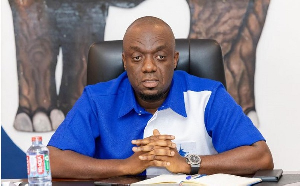A research culture
By making research the core strategy by which our society depends on, many opportunities arise for us to move from the state we find our nation and continent as a whole to a better one. Research will help us find and define most of our problems in their right perspectives. It will help us identify the required tools and methods in dealing with our problems. It will help us determine the leverage areas from which we can make holistic and systematic improvements. As always, most problems are entangled with many others and solving one unilaterally may not necessarily improve the general situation and could even result in worsening another. The leverage area is like the rudder of the ship which when turned in a small angle results in a significant change of direction and could redirect the whole ship from its current course. A small improvement in this area results in an improvement in the other areas. Research based on systems dynamics/engineering for instance, could be very useful in identifying the leverage area(s) of our problems. With this done we could then come up with strategic policies which will see us through realising the solutions.Without concrete research, much of the policies which our government, social and business institutions design and implement will lead us nowhere. Many times, they rather result in worsening our situation. Parliament for instance could unproductively spend weeks debating and drafting policies which are based on misinformation and wrong ideas thought to be good. Winning a majority on a policy which is based on wrong information could only aggravate our situation and likely lead to an end product or project which someone has termed ‘applied ignorance’. In reality, that is what most of our institutions in Africa find themselves doing every now and then.
Considering the situation in which the African finds herself, making research part of our everyday lifestyle will make a big difference in the way we think and do things. As much as the various institutions will improve by adopting a research culture, it will pay much more if the individual adopts it too. Thus a society that is marked with a research culture could be created. It will result in a new breed of Africans who defy the old traditions of hoping to find wisdom and knowledge in the paradigm of age and rather launch out with a new attitude which embraces the challenge of coming up with solutions to their everyday problems and even look out to find new problems on their own and come with possible solutions. Until this is adopted in our way of life and thinking, we would not be able to make any meaningful contributions to our world and to the development of humanity. Our wisdom will not be able to lead us to do anything significant neither will it be heard by others. Our children will not see any hope in our development efforts or the policies the government will design. We will keep doing things in the same misguided manner we have been doing. The poverty cycle will never be broken and we will be far left behind. The few who get the opportunity to be educated will either find themselves in government or elsewhere doing things the same old way or will look for greener pastures abroad in the light of the confusion.
Our educational constraints
Education is normally considered as the backbone of every economy. It plays a very crucial role in the formation and development of the members who form the society. It also serves as the formal centre where the individuals of the society are trained over a period of time, the concepts of research and development. We however live in societies where education is seen by few people as crucial to the development of our lives and economies at large. Many see it as an investment which is only necessary when there are some extra monies to be spared. This notion has partly accounted for the numerous numbers of semi illiterates and illiterates in Ghana and Africa as such. Most parents do not see the need for educating their children in the face of economic hardships. They would rather have them do some work to support the family. In some cases, the children rather choose to earn than attend school. In effect, the main purpose of education and the necessary motivation that is needed by the partners to support it seem to diminish at an alarming rate in the society. In this wise, one can see that gigantic projects of the government to make primary education free may not necessarily help to improve school turnout. It is easy to reject this point but if each one of us goes to his province or hometown and asked to make a tally of how many children are in school and ongoing, one would find out that not more than 70% of the school going population would be in this category. In this 21st century of speedy development, no nation or family as such can afford to have a single individual remain illiterate or semi illiterate. Ghana’s educational system is one area that appears to have failed the country in many ways.To me, it has failed in the sense that for all these years little has been done to make room for improvement and meet the societal needs as a whole. As one moves from the primary schools and up, it is pretty obvious that only a few are able to make it to the tertiary level. Today however, the first degree is considered as a basic degree all over the world, yet, it is not a usual thing to have a Ghanaian earn one, much more a postgraduate degree.
In a study on Ghana’s labour market, poverty and employment, Sudharshan Canagarajah and Dipak Mazumdar had noted that one of the major constraints in Ghana’s growth challenge has been the lack of human capital development. According to them, enrolment rates have not been picking up fast and the future trend of human capital does not look optimistic. They even mentioned the claim that the slack private sector investments in Ghana might be a result of lack of skilled labour and lack of adequate human capital stock. I do not want to go into any analysis of our educational system but it is sad that it has not improved to meet the growing societal needs just like many of the other sectors. Yet it is acclaimed by some of our educators as one of the best in the world!
In a recent development, a committee was set with the objective to look into Ghana’s education reform. Accordingly, the committee which is made up of 20 members and chaired by Prof. Jophus Anamoah- Mensah was commissioned by the President in January 2002 to undertake a review of the entire education system after 15 years of educational reforms in the country. The committee in their work had come up with some interesting facts about Ghana’s educational system. They highlighted some of the areas wherein the system exhibit problems and made recommendations for improvement. According to the news article, ‘the Committee said the world is facing rapid challenges in all aspects of life and as such the educational system must provide opportunities at both formal and informal levels for individuals to improve on their competences in order to meet the demands of the changing times’. This is indeed a step in the right direction and had it been done earlier, we would have been some steps ahead in improving the system. I would like to refer and encourage the reader to read their report on the news article ‘Education Reform Is Defective -Public Agenda’ at www.ghanaweb.com: Press Review of Friday, 07 November 2003.
To overcome the limitations and constraints we find in our economy and equip the society for development, it is imperative for us to consider formal and informal education with the aim of informing and instilling a sense of research, alongside the key principles as required by the course in question, for everyone. Thus every Kwajo, Kwaku and Akosua must learn through participation, in and out of the classroom, on the job, at state, everywhere, at all times, with research at the forefront regardless of his or her academic background. In so doing, we set out to become a learning and research-cultured society. Part 3 will follow shortly with the required guidelines to achieve this so stay put.
Jojoe Yartey
Industrial Engineer

Views expressed by the author(s) do not necessarily reflect those of GhanaHomePage.
Industrial Engineer

Views expressed by the author(s) do not necessarily reflect those of GhanaHomePage.














